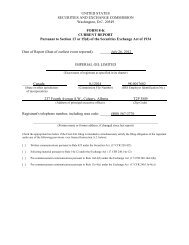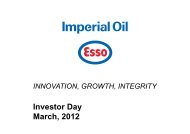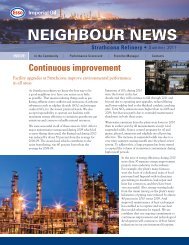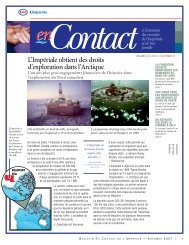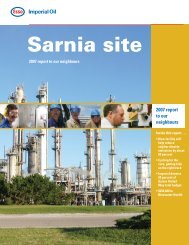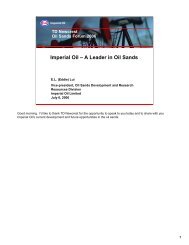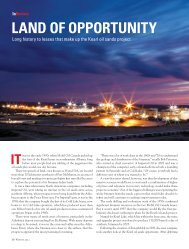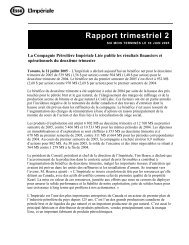FORM 10-K IMPERIAL OIL LIMITED
FORM 10-K IMPERIAL OIL LIMITED
FORM 10-K IMPERIAL OIL LIMITED
Create successful ePaper yourself
Turn your PDF publications into a flip-book with our unique Google optimized e-Paper software.
(c)<br />
(d)<br />
(e)<br />
The amount by which accumulated benefit obligations (ABO) exceeded the fair value of fund assets at year end<br />
(page F-13, note 7). For funded pension plans, this difference was $446 million at December 31, 2004. For unfunded<br />
plans, this was the ABO amount of $313 million. The payments by period include expected contributions to funded<br />
pension plans in 2005 and estimated benefit payments for unfunded plans in all years.<br />
Asset retirement obligations represent the discounted present value of legal obligations associated with site<br />
restoration on the retirement of assets with determinable useful lives.<br />
Other long term agreements include primarily raw material supply and transportation services agreements.<br />
The Company was contingently liable at December 31, 2004, for a maximum of $175 million relating to<br />
guarantees for purchasing operating equipment and other assets from its rural marketing associates upon<br />
expiry of the associate agreement or the death or resignation of the associate. The Company expects that<br />
the fair value of the operating equipment and other assets so purchased would cover the maximum potential<br />
amount of future payment under the guarantees.<br />
Various lawsuits are pending against Imperial Oil Limited and its subsidiaries. Based on a consideration<br />
of all relevant facts and circumstances, the Company does not believe the ultimate outcome of any currently<br />
pending lawsuits against the Company will have a material adverse effect upon the Company’s operations<br />
or financial condition. There are no events or uncertainties known to management beyond those already<br />
included in reported financial information that would indicate a material change in future operating results<br />
or financial condition.<br />
Recently issued Statement of Financial Accounting Standards<br />
In December 2004, the Financial Accounting Standards Board (FASB) issued a revised Statement of<br />
Financial Accounting Standards No. 123 (SFAS 123R), Share Based Payments. SFAS 123R requires<br />
compensation costs related to share based payment arrangements to employees to be recognized in the<br />
income statement over the period that an employee provides service in exchange for the award. The amount<br />
of the compensation cost will be measured based on the grant date fair value of the instruments issued. In<br />
addition, liability awards will be remeasured each reporting period through settlement. SFAS 123R is effective<br />
as of July 1, 2005 for all awards granted or modified after that date and for those awards granted prior to that<br />
date for which the requisite employee service has not yet been rendered. SFAS 123R will have no impact on<br />
the Company because in 2003 the Company adopted a policy of expensing all share based payments that is<br />
consistent with the provisions of SFAS 123R and the requisite employee service for all prior year outstanding<br />
stock options has been rendered.<br />
Emerging accounting and reporting issues<br />
Accounting for purchases and sales of inventory with the same counterparty<br />
At its November 2004 meeting, the Emerging Issues Task Force (EITF) of FASB began discussion of<br />
Issue 04-13, “Accounting for Purchases and Sales of Inventory with the Same Counterparty”. This Issue<br />
addresses the question of when it is appropriate to measure purchases and sales of inventory at fair value<br />
and record them in cost of sales and revenues and when they should be recorded as an exchange<br />
measured at the book value of the item sold. The EITF did not reach a consensus on this issue, but<br />
requested the FASB staff to further explore the alternative views.<br />
The Company records certain purchases and sales entered into contemporaneously with the same<br />
counterparty as cost of sales and revenues, measured at fair value as agreed upon by a willing buyer and a<br />
willing seller. These transactions occur under contractual arrangements that establish the agreement terms<br />
either jointly, in a single contract, or separately, in individual contracts. Should the EITF reach a consensus<br />
on this issue, requiring these transactions to be recorded as exchanges measured at book value, the<br />
reported amounts in “operating revenues” and “purchases of crude oil and products” on the consolidated<br />
statement of income would be lower by equal amounts with no impact on net income. The Company has<br />
not yet determined the amount by which “operating revenues” and “purchases of crude oil and products”<br />
would be lower under this interpretation. A special effort is needed to identify purchase/sale transactions<br />
from other monetary purchases and monetary sales. A best effort estimate based on this undertaking is<br />
expected to be available in the second quarter of 2005. The Company will disclose this information, if<br />
material, once it is available.<br />
Critical accounting policies<br />
The Company’s financial statements have been prepared in accordance with United States generally<br />
accepted accounting principles (GAAP) and include estimates that reflect management’s best judgments.<br />
The Company’s accounting and financial reporting fairly reflect its straightforward business model. The<br />
Company does not use financing structures for the purpose of altering accounting outcomes or removing<br />
debt from the balance sheet. The following summary provides further information about the critical<br />
accounting policies and the estimates that are made by the Company to apply those policies. It should<br />
be read in conjunction with pages F-7 to F-9.<br />
23



